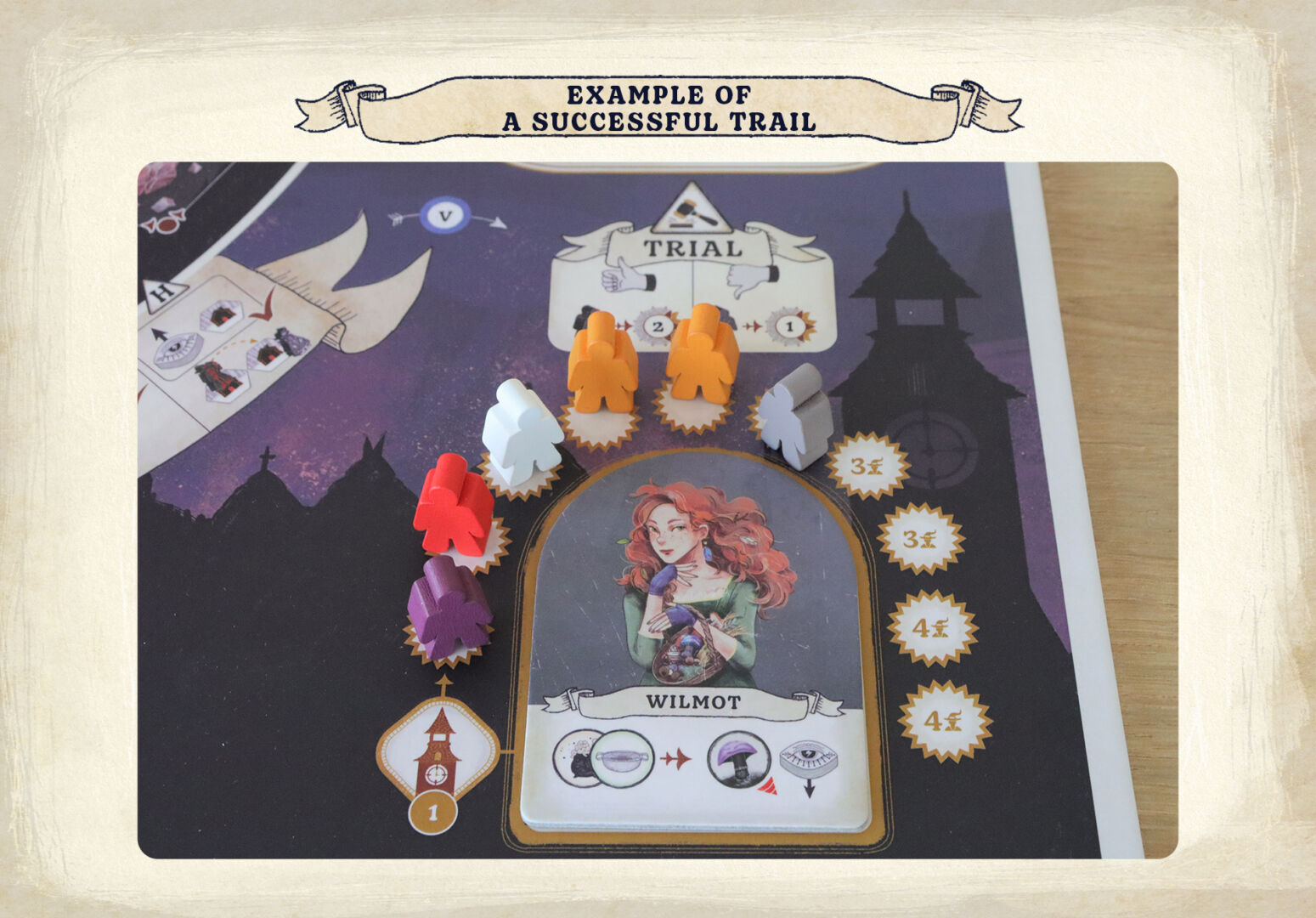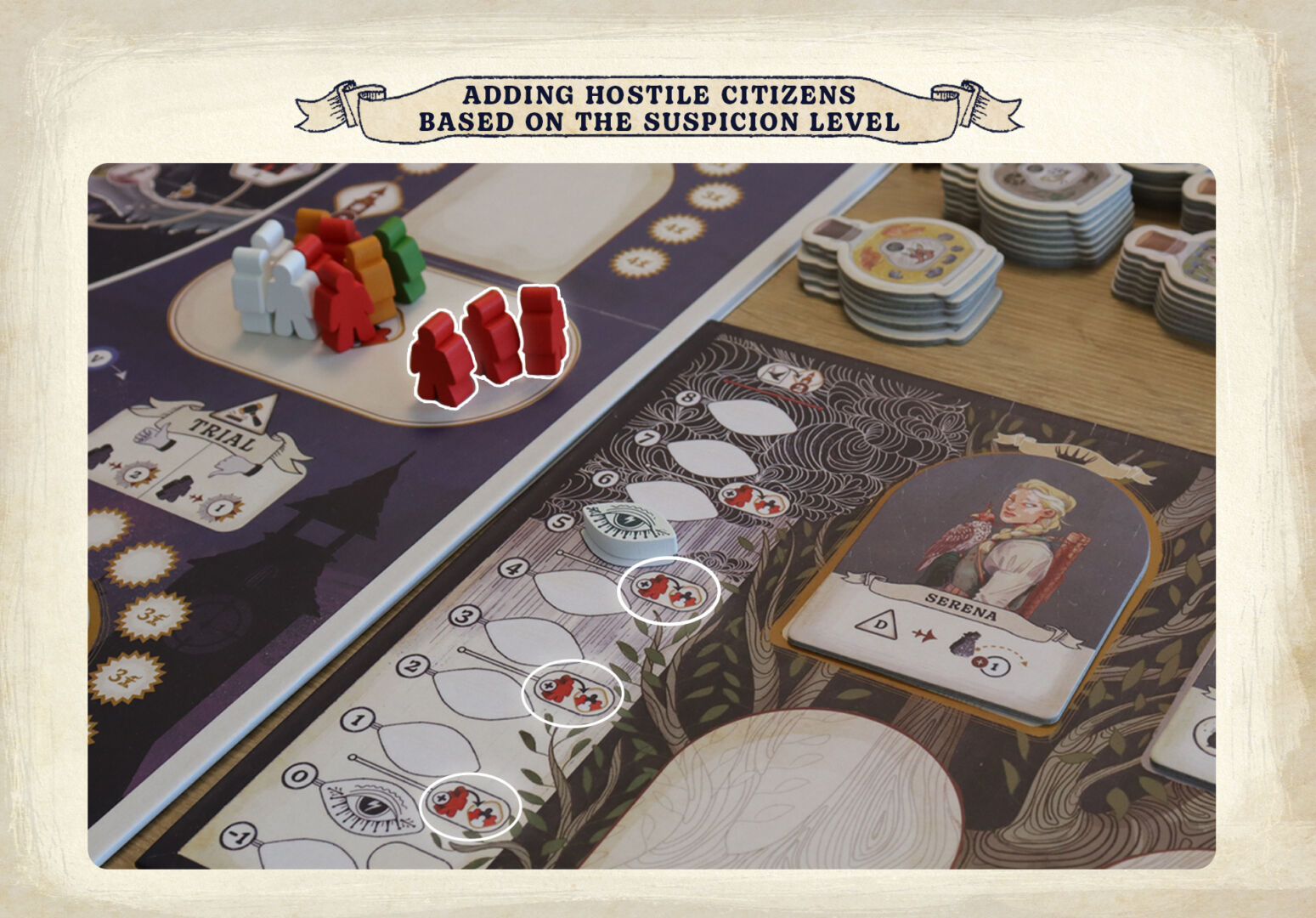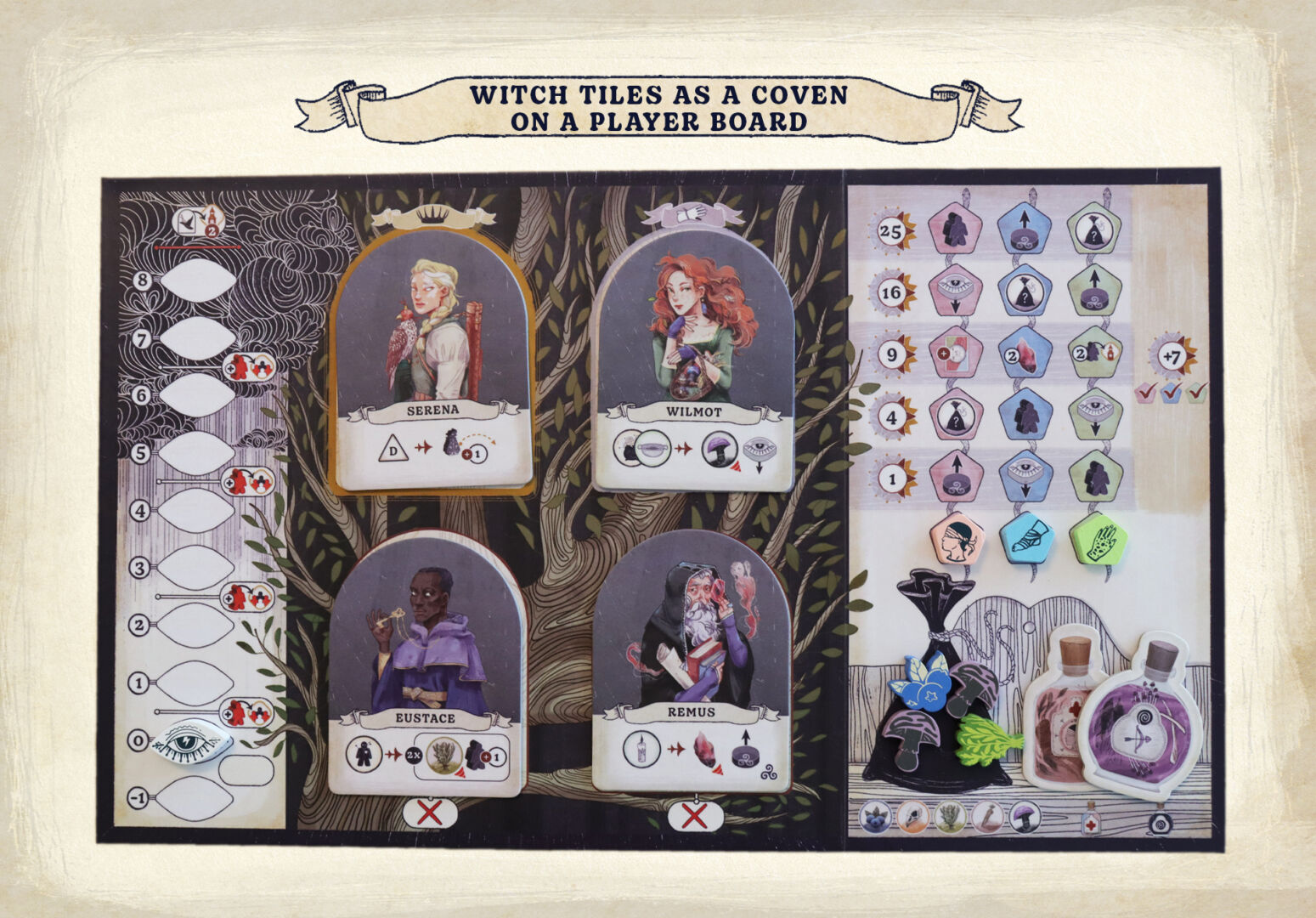Covens, Trials and Right Amount of Threat
2022. May 20.
Good day, townsfolk! I’m back today with the next installment of my Designer Diaries, continuing the overview of Septima’s main mechanisms. Last week, we covered the positive player interaction and the threat of the Witch Hunters, while today I’ll talk about the Trials and the role of the Covens in Septima. Let’s get into it!

In the first iterations, I really wanted to make the game semi-cooperative. It is a difficult task, but games like CO2 inspired me to try to do something similar: all players are in competition, but there is an aspect that has to be kept in check collectively, and if it drops below a level all players lose the game. In the case of Septima, the idea was that if a certain number of witches are exiled from the town or the collective suspicion rises above a certain level, all players lose the game. We went through many iterations of this idea, but despite it fitting thematically, the game just kept feeling weird with this common peril that can ruin the game for all players, which even opened it up to some unintended player behavior such as losing players intentionally sabotaging the common goal.
Yet even though all “official” semi-coop mechanisms have been gradually removed from the game, there was one idea in the original system that I wanted to preserve: even though we play as rival covens, ultimately we are a single community of witches, and we are all facing suspicion and peril. So I needed a mechanism that reflects this, something that treats all players as a community and reacts to them accordingly. This mechanism is the Trial.

The Trial has been part of the game from very early on, and while it’s probably the single most iterated mechanism, its core idea remained the same: every Season (one of the four major game rounds), up to two Witches are accused by the townsfolk, and at the end of the Season, trials are held to decide their fate: if found innocent, the accused witch is released and joins the Coven that put the most effort into defending them, but if found guilty, they are immediately exiled from the town. The Witch on trial can be “neutral”, but also someone taken from a player’s Coven by a Witch Hunter during the season - in this case, it is very possible that they actually end up in a different Coven!
Fortunately, the Trials in the world of Septima are a lot more fair than in medieval times, and you have plenty of ways to manipulate the odds in your favor. While the citizens that will ultimately form the jury are drawn from a bag at the end of season, the pool which we draw them from (aptly called the Crowd) is fully visible during the season. It consists of neutral, hostile and loyal citizens, and one of the main strategies in Septima is manipulating the composition of the Crowd. You’ll want to recruit, charm or heal enough of the townsfolk so that when it’s time to draw the jury, you have enough loyal supporters to outnumber the hostile ones and release the accused witch.
This is where the semi-coop vibes shine the most: on one hand, all players’ loyal citizens count towards outnumbering the hostile ones and winning the trial, but on the other, new hostile citizens are added to the Crowd before each trial based on the collective Suspicion level of all players - if everyone is playing recklessly, it will be pretty hard to win those trials. With that, we can keep the feeling that there are collective consequences of our actions without ruining the whole game with a common losing condition.

Both the Trial and the Witch Hunter mechanisms serve a very important purpose in Septima, that’s also quite fitting thematically: to present just the right amount of threat to keep players excited. Fine-tuning this is a very delicate task, and this is what took most of our development time so far. Unfair Trials and oppressive Witch Hunters are too stressful while breezing through the city and rescuing everyone becomes a boring min-maxing exercise. Between those two extremes, however, there’s a ton of excitement and plenty of room for individual playstyles for the careful and reckless alike.

I’ve had the opportunity to hold several lectures about board gaming culture for both students and companies, and I used to try to explain the main differences between the archetypical “ameri” and “euro” categories games as it was at the dawn of modern board gaming. While the lines between these categories are increasingly blurry, I believe that their general point of view still sets them apart. In ameris you often take on the role of a hero, an individual character with several stats and strengths. In contrast, in eurogames you often see the events from a higher perspective: you are running a kingdom, a company or a group of people.
In the first iterations of Septima, I was thinking about individuals, independent witches competing for the role of the Septima. But as I developed the game, it started feeling a bit odd. Why are those people alone? Where are the others, the famous covens of the world? So from individuals I started to move towards the idea of groups in the game, and based on the reactions, this was one of the big “wow” moments of the design. We start the game with only two witches but we do not travel to Noctemburg for fame and wisdom alone, but also to expand our family, save innocent witches, and add new unique abilities to our group. In every game you manage different abilities and personalities, and it feels fresh and familiar at the same time. And you all know the feeling very well when you just come short of winning, but you feel you created something which is yours. In Septima this is your coven – your family!

I hope you enjoyed this little sneak peek at how the most important mechanics of Septima work and how they tie into the theme. Obviously, there are still a lot of finer details beyond the scope of these posts, but we’ll leave those for the Kickstarter - for which we have an official launch date, June 16!
Thanks for reading, and I’ll be back next week with a more detailed look into the world and theme of Septima.
Until next time,
Robin